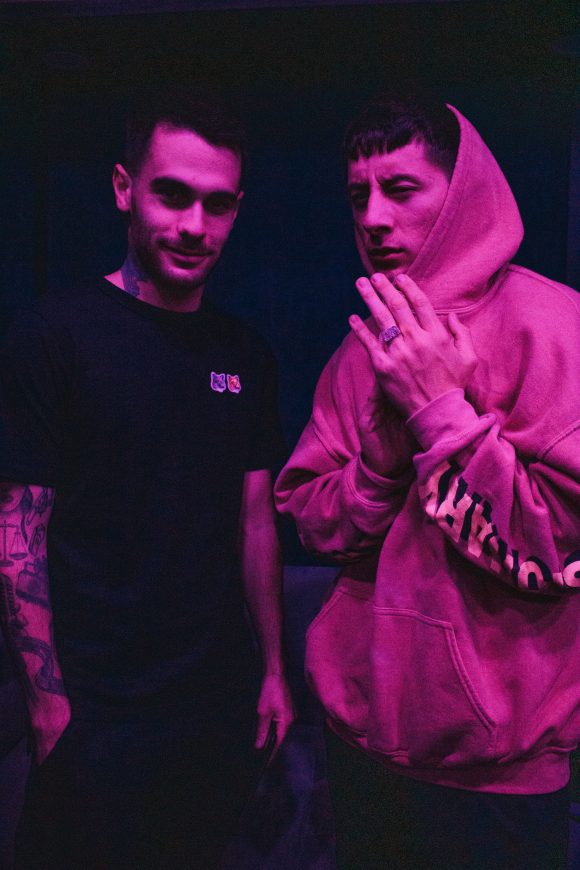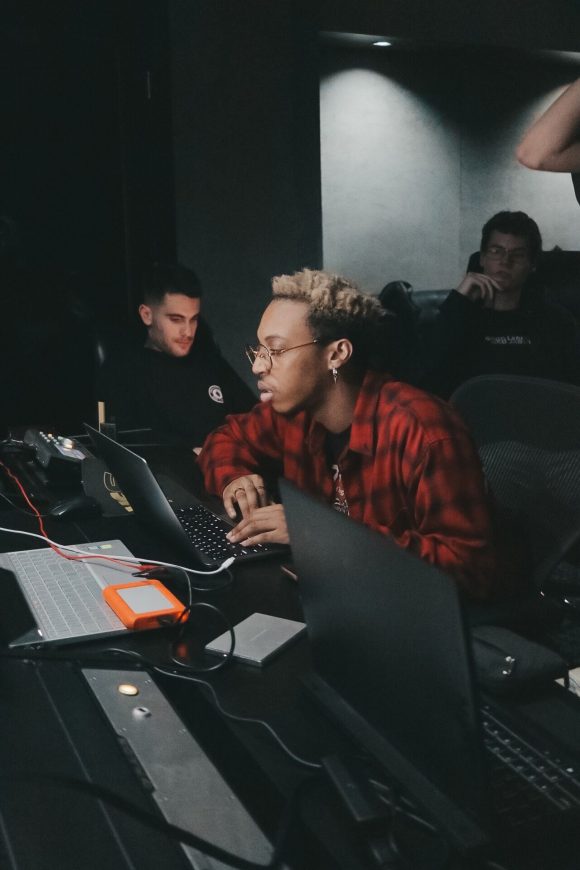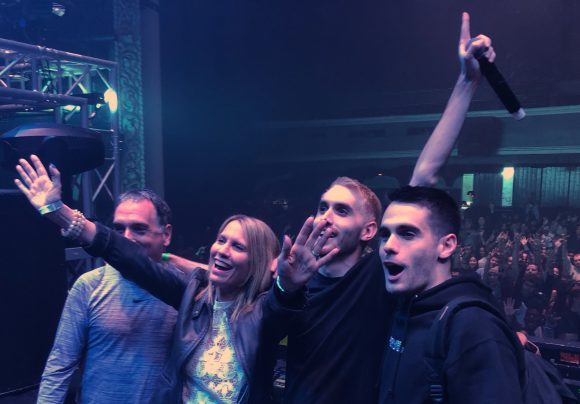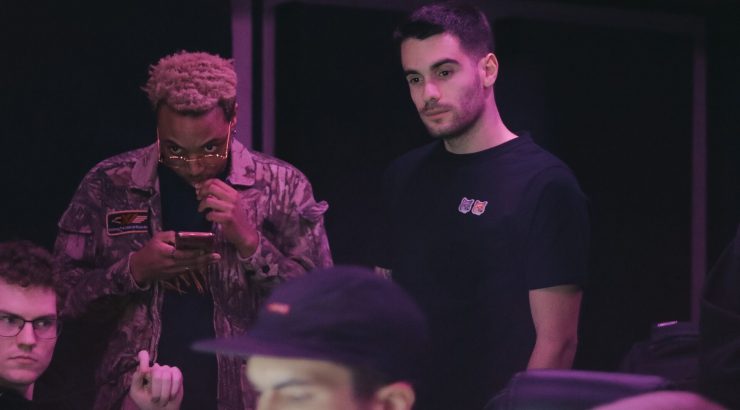Finding the Pieces that Fit Into the Puzzle Senior Spotlight: Alex Hallerman '20
May 13, 2020
Alex Hallerman, like many other seniors in the School of Communication, will be graduating next week and venturing out into the “real world”. But, Alex isn’t like most other seniors. He is one of our non-traditional students. Alex transferred to Chapman from Santa Monica College at an age when most traditional students have graduated and been in the workforce for a few years. As a transfer and commuter student, Alex has made the most of his Chapman experience and we asked him to share with us how he did this and what is next for him.

Alex with his current rostered artist, gavn!
You are graduating this May, what’s next for you?
I will be continuing the pursuit of my career in music talent management that I started while at Chapman. Over the past year, I’ve had the opportunity to leverage my skills in communication, negotiation, digital marketing, and my ear for talent to accomplish some incredible things. An artist I scouted last May just signed a six-figure recording contract to a major label, that same artist has amassed millions of streams across multiple platforms in less than a year while we worked together, multiple individuals I’ve worked with have received various placements with Grammy-nominated musicians through my networking capabilities, I helped a collective of produces legitimize their business and become incorporated through consulting, and the artist I’m working with currently is on the path to becoming an international stadium act. I also had the opportunity to intern in the digital department at one of the most respectable labels, distribution, and touring companies in the industry where I learned how crucial proper management is to an artist’s career and how to execute that role. Today I have a tight-knit roster of artists and producers who trust me with the development of their career and I’m excited to see all of our hard work come to fruition as I continue along this journey.
Why did you choose Chapman and the School of Communication?
Chapman offered a way more in-depth Communication program (having its own school for example) than my other options so I liked the aspect of having a wider course selection to cater to my interests. I started the Communication route while I was at Santa Monica College and loved all my professors and courses so that’s what made the most sense when transferring to Chapman. For the “why” Communication, interpersonal relationships are huge in the entertainment sector and I think the School of Communication does a great job dissecting and enhancing our knowledge of every aspect of these relationships.
Was there a faculty member that made an impact on your time at Chapman?
Dr. Hannah Ball has helped me through my professional and personal growth while at Chapman. I had the pleasure to take Research Methods with her my second semester and later on she was my internship adviser over two semesters. The structure that she brings into her classroom and the effort into conveying material to her students made an already intense course much more enjoyable and fruitful. While dealing with some personal challenges outside of the classroom she was there for me every step of the way with nothing but positive encouragement. As my internship advisor, she was an advocate for the pursuit of my career interests in both the educational and professional sense. Thank you so much, Dr. Ball!
Was there a course or opportunity within the School of Communication that helped you along the way?
I found Communication Law with Jeff Compangano to be the most insightful course within the School of Communication. The material taught and the class discussions lead to a better conceptualization and understanding of legal verbiage for me. This has been incredibly useful in my efforts to review contractual information for the people I work with today when a lawyer isn’t present.
You interned in the music industry. Tell us about that experience.
Last summer I secured an internship position in the digital department at M Theory which is a non-traditional music company that provides services in areas of management, production, distribution, touring, and more. When I say non-traditional I mean it basically acts as a label as well as distribution company but on a smaller scale (operates in a similar fashion to major labels, independent labels, and distribution services) with offices in LA, NY, and Nashville.

Alex working in the studio.
I spent my time assisting the digital team in their tracking and analysis of partnered and serviced artist’s releases on multiple DSPs (digital streaming platforms). This information would then be used in real-life application such as how the team would strategize and quantify what a campaign should look like for a particular album or song (based on how it was streaming), whether they should continue efforts on an album or song (is it doing as expected), and what markets a song could appeal to (blowing up a song in a particular country outside the US). A lot of this data and results are also used to decide where touring would be most effective.
In relation to school: word usage and perception were huge when engaging in email conversations or being tasked with work. Everything I picked up on at M Theory I applied to work with my artists in management. I think management can mean a lot of tasks to different artists and not every manager will have the same role – some will come equipped with different capabilities and maybe even what they think their role as a manager should be. I feel grateful to have had this experience in understanding data and how that will impact release schedules, how much money should be put into a project, what type of promo should be used, etc. (the list can go on) – that maybe some other managers don’t have. It allows me to be extremely critical of the decisions I help an artist make in their career and where the money is put, whether it’s their own or an investor’s (such as a label or outside partner or even mine). M Theory is a gem in the industry and I honestly felt 10x more confident in my role in management after I left there.
Any advice for commuter or transfer students?
As someone who lived in LA (WEHO to be exact) and commuted at least 1.5 hours to Chapman multiple times a week back and forth for some time I’d say feeling distant from the community is bound to happen at some point. It’s important to form relationships with your peers in other classes if you are not involved with on-campus activity (which may be difficult if you live far away, as it was for me). As someone who turned 25 at Chapman my first semester, I was more interested in jumpstarting my career while at school so I really didn’t take part in clubs or after school activities to meet people. I became friends with someone in every class (and some of those overlapped) and some of those have only been school-related but one, in particular, blossomed into an awesome friendship through common interests in music.

Alex and his parents at his younger brother’s set at Avalon.
I’d say I made it work and it was really about finding the pieces that fit into the puzzle as I was so far away from school. I organized two guest speaker sessions while at Chapman for my cousin who was a force in Hollywood and now works in the mental health sector. We took my Agents & Managers course up to WME (the entire class traveled to Beverly Hills!) where she spoke on her experience in entertainment from assistant, to an agent, to partner (she ran multiple departments at WME, CAA, etc.) I also had her come down to Chapman to speak in my Child Abuse course on the topic of trauma (and I spoke on my own recovery experiences as related to sobriety during the same class).
This filled in that piece for me of adding value to the school as she still tells me today how she talks regularly with students from both classes and how amazing the feedback was. Looking back now I’d say I definitely had the school experience that fit exactly what my needs/wants were and (while not the normal college experience) I’m really happy I made the decision to transfer to Chapman, it worked out exactly how it was supposed to.
Alex currently manages artists gavn! and lil raspy and producer Jakebreh.


